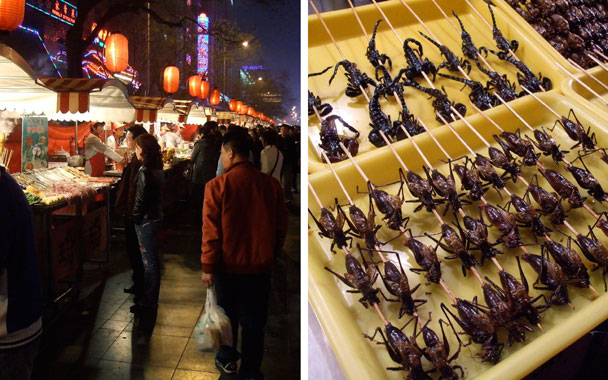When you’re traveling abroad and a local sticks his tongue out at you, it’s usually not a good sign. On a recent visit to Beijing’s Night Food Market, however, when a dignified older gentleman showed me the inside of his mouth, I sensed he was welcoming me to that popular outdoor dining spot. Clearly, he wanted me to know that the half-chewed scorpion on his tongue was both safe to eat and delicious. Grabbing my elbow he pulled me toward serving platters laden with deep-fried centipedes, crickets, grasshoppers, scorpions, silkworms, and starfish. Most of these snacks were neatly arranged kebab-style, on wooden skewers.
“Go ’head!” my new friend cried, grinning. “Perfectly safe! Taste like potato chip!” It was an offer I could refuse.
Then again, why had I come to the Night Market, renowned as a smorgasbord for entomophagists (people who eat bugs), if not to broaden my palate? On past trips, I had consumed the lime-spritzed chipulines, crickets beloved by Oaxacans; and in Cambodia, I’d sipped snake’s blood. Surely, I could bite a beetle in Beijing.
This dining dilemma occurred on Wangfujing Street, near the Forbidden City, where every evening from 4 until 10, a long row of food stalls lights up with dozens of red lanterns (they’re thought to bring good luck). Patronized by Beijingers as well as tourists, the Night Market is a fun, nearly frantic spot.
Of course, China’s capital is home to many excellent restaurants (see Gourmet, July 2008) where you can taste exquisitely crisp Peking duck or dumplings made with nearly translucent dough; but according to David Gracer, you’d be much better off savoring a caterpillar or katydid. Gracer is a professor of English at the Community College of Rhode Island in Providence and his website advocates entomophagy as an environmentally sound dietary option. “If cows and pigs are the SUVs of the food world, then bugs are its bicycles,” he said, citing a 2006 report by the United Nations that calls the livestock sector one of the most serious environmental problems on earth, responsible for more greenhouse-gas emissions than transportation worldwide. “Harvesting insects is ecological; they’re low in fat, and they’re comparable sources of protein,” Gracer enthused. “Bugs are also downright tasty!”
With this is mind, the centipede kebabs looked marginally more appealing. Sliding one off the skewer with my teeth was cringe-inducing, though, as the insect’s little legs tickled my lips. Crunch, crunch! I was surprised to discover it wasn’t all that different from eating a soft-shell crab—sort of a slightly salty combination of crackly crust and a moist, gooey center, but with an earthy aftertaste similar to a portobello mushroom. Crunch, crunch, crunch. Yes, it was something like a funky Frito.
By now, my Chinese friend had circled back and was checking up on me. I stuck my tongue out at him, and he gave me a huge smile. We’d begun what you might call a tempestuous relationship.

